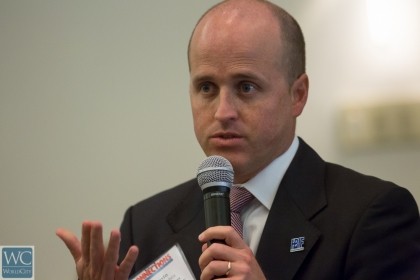Billion Dollar Bosses: Brightstar, Electrolux and Brinks chiefs share secrets, strategies
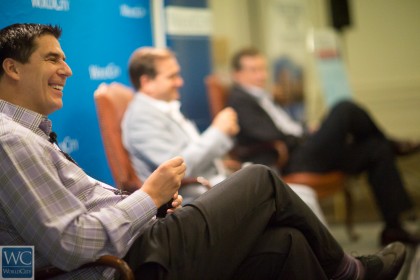
Here’s the kind of challenge that billion-dollar bosses face: You’re selling cellphones for $1 per day in developing nations where there are no credit reports on the low-income customers you serve. How do you know who’s most likely to pay, so that you can tap one of the world’s largest markets?
Marcelo Claure, founder and chief at cellphone giant Brightstar Corp., who is pictured above on the left, has found some answers: His company now looks at how people communicate on Facebook, Twitter and other social media and who their friends are, recognizing that “bad people hang out with bad people.”
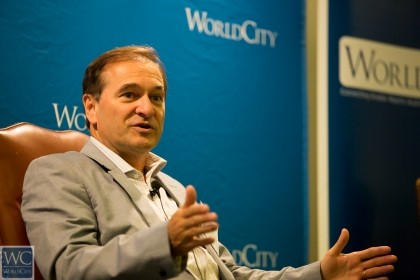
Joao Claudio Guetter, president of Electrolux Major Appliances Latin America. Photos by Carlos Miller
In pre-approved terms for phone contracts, it gets permission to write on your page that you’ve not met your obligations, a public shaming that tends to motivate people to pony up.
Plus, it’s now working with tech labs to build an algorithm “to predict who will pay,” said Claure, the visionary behind the Miami company set to double its revenues this year to $20 billion.
That was just one insight from a trio of Miami business leaders who oversee operations posting at least $1 billion in annual revenue. The three shared secrets and strategies at WorldCity’s Global Connections on May 30 in a discussion that even touched on refrigerator handles and bullet-proof vests.
Joao Claudio Guetter, president of Electrolux Major Appliances Latin America, said he focuses on understanding his customers, including a preference in Mexico for brightly colored refrigerators with big, chunky handles. “That won’t sell one unit in Brazil, where they like more European style,” he said.
Gabriel Allen, president for Latin America for security services company Brinks, said he strives to understand business operations inside and out. To do so, he’s learned to shoot a gun and worked as a guard in an armored car, donning a bullet-proof vest and feeling the rush of vulnerability to attack.
Claure said the key challenge for bosses is how to keep companies on top in a fast-changing world.
“I’m constantly thinking, “What’s next?,” said Claure, who developed Brightstar from a cellphone distributor into a supply-chain specialist active from manufacturing to buy-backs, insurance to financing phones. “You should never think that what you’re good at today is what you’ll be good at tomorrow.”
Leadership styles and tips
WorldCity President Ken Roberts asked the panelists about how they lead.
Brinks’ Allen said he’s team-oriented, constantly challenging his team to accomplish goals and then, to set new ones.
Claure said he tries to lead by example. He aims to be clear in communication with employees on “where you want to take them” and to be “honest” about what’s going on and what it will take.
“To be a good leader, you also have to work hard,” added Guetter, finding no substitute for long hours.
All three also stressed the need to innovate.
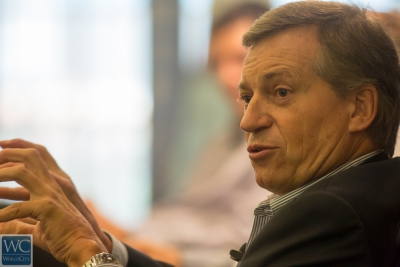
Gabriel Allen, president for Latin America for security services company Brinks
Allen said he turned around a troubled unit in Argentina and then expanded Brinks across Latin America to reach $4 billion in revenues yearly, thanks in part to new systems for operations. Those include a new regional headquarters in Miami that will add oversight of Brink’s U.S. operations next year too.
“We’re innovating with customers inside their businesses,” helping them improve cash management within their company, said Allen.
Sweden’s Electrolux – the maker of Frigidaire, Westinghouse and other brands – now is designing appliances to connect with the “Internet of things.” That means, for example, refrigerators that can register when the milk has been finished, perhaps sending a message to the supermarket to deliver it.
Innovation also means tapping new or underdeveloped markets, the trio said.
“Our last frontier is Africa,” said Guetter, noting Electrolux until now has sold only in the country of South Africa . “We’ve put together a team to develop the whole continent.”
Running a billion-dollar business
Audience members asked questions on varied subjects from marketing to scaling up and Miami’s future.
How do you handle corporate marketing strategy – by country or globally?, asked Lewis Greenberg, director of marketing for Daszkal Bolton, an accounting and advisory firm.
At Electrolux, as in many other multinationals, marketing often moves in waves, said Guetter, with a little laugh. “Everything is centralized. Then, you change the CEO, and everything is decentralized.”
At Brightstar, where marketing is mainly business-to-business directed at other companies, Claure opts to “centralize the back-office and decentralize the front-office, so you can build customer solutions based on each market.”
What was your biggest challenge growing from a small operation to a big one?, asked Augusto Sanabria, president and chief executive at the Hispanic Business Initiative Fund.
Capital is a hurdle at first, when banks don’t know you and won’t lend to you, said Claure. Later, there come the difficulties of juggling operations in different time zones and with different cultures.
“At the end of the day, there’s no book” on how to lead a global company, said Claure. “You follow your gut. You talk honestly to people and have good products and services.”
What do you see as the next evolution for Miami as a community?,” asked Ana Martinez, a senior director at United Way of Miami-Dade.
“Miami needs a soccer team,” said Claure, who is teaming with soccer star David Beckham to bring a Major League Soccer team to the city. Participants erupted in applause.
Miami also could use more global headquarters of multibillion-dollar companies, not just Latin American headquarters for multinationals, added Claure.
New consumer innovations
What’s the next killer innovation you see for consumers?, Jose Valdes, senior vice president at BankUnited, asked the business chiefs.
For appliances, the push is toward more efficient products. That includes a washing machine that uses half as much water and microwave ovens that also can grill and steam food, said Guetter.
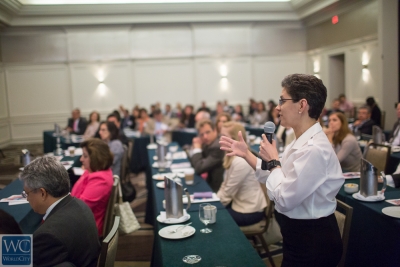
Ana Martinez, a senior director at United Way of Miami-Dade.
Among cellphones, already huge changes in technology soon will be even grander, said Claure.
“Five years ago, none of us would have guessed everything we do is connected to a mobile phone,” Claure said. “And what if I were to tell you a cellphone will extend your life by 10 years?”
It’s happening because new diagnostics inside phones can check your body and send information to a centralized place, allowing for better preventive medicine, Claure said. Some diagnostics on wearable technology also will seem “like you are going to have a doctor inside you 24-hours a day.”
Global Connections is one of six event series organized by WorldCity to bring together executives in greater Miami on international business topics. The Global series is sponsored by Florida International University School of Business, real estate company Waterford and public relations firm Edelman.
The next Global Connections session is set for June 27 on “Corporate Social Responsibility: From PR Ploy to Brand Builder.”
